- Home
- Brandon Mull
Tales of the Great Beasts Page 2
Tales of the Great Beasts Read online
Page 2
Working together, his parents had left Stetriol better than they’d found it. There was no debating that. It was a fact.
It was Feliandor’s rotten luck that he had inherited a kingdom at its peak. It had nowhere to go but down. Stetriol was in a state of decline. Many people throughout the land were looking for a scapegoat, someone to blame as their lives became more difficult. They didn’t blame geography or weather patterns. They blamed their king.
Fel studied the portrait now. For the hundredth time he looked for something of himself in his parents’ faces. It was as if he’d inherited only their plainest features — and their problems.
Stetriol’s decline wasn’t his fault; Fel, at least, knew this. The coasts were vibrant, rich with life and graced with moderate weather. Just a little bit inland, though, the coastal area ran into the Red Mountains, a range that ringed the interior of the continent. And that interior was arid, inhospitable, home to ghastly, venomous animals and little else.
The vast expanse of Feliandor’s kingdom was unable to support human life, and the coasts were getting crowded. Thanks in part to his parents’ reforms, the populations of the coastal towns were booming. The people had nowhere to go. There wasn’t enough work. Poverty was rampant, and that had led to crime and unrest.
The arbor project had been his last desperate hope. If the land was the problem, then he would change the land. He had sent a dozen of the kingdom’s most able colonists to erect a temporary settlement just on the other side of the mountains. Their goal: to manipulate the soil so that it could support a wider variety of plant life. He wanted Stetriol to boast a Niloan jungle or a Euran forest.
But everything they had planted would die.
Movement near the ground caught Fel’s attention. At first he feared it was a snake, escaped from the afternoon’s grim adventure. But then he saw it clearly. It was a mammal — the same rodent-like creature he’d seen in the throne room earlier that day.
“Hello there,” Fel said. “What are you up to?” He realized too late that he must sound childish to the guard standing sentry in the hallway.
The creature stood on its hind legs, clicked its teeth at him, then fell to its four feet and walked away. It stopped partway up the hall and turned its head to look back at him.
“You want me to follow you?” Fel asked.
The mammal clicked again, then continued up the path. Its obvious intelligence left no doubt — this was a spirit animal. Fel had suspected as much when he’d seen it earlier, though he knew it didn’t belong to any of his guards. His curiosity was piqued. He turned to the nearby guard. “You there,” he said, and the sentry somehow managed to stand even straighter. “Come with me. And stay close.”
The animal led them to an outside courtyard. The night air was balmy and smelled of the ocean. For a moment, Fel felt a rush of joy. The best days of his childhood had been spent at the beach, away from the drab castle, and the smell of salt water on the wind was enough to take him back to more carefree times — but only momentarily. Then a figure stepped from the shadows, and the guard at Fel’s back drew his sword. Fel remembered very suddenly that his life had not been carefree in some time.
The figure dropped to one knee. “I come in peace,” she said.
Fel recognized her instantly as the Niloan woman from the throne room. He held out a hand to stop the guard’s advance. “Hold. It’s all right.” He looked over his shoulder at the guard and lifted an eyebrow. “But keep your sword ready.” He turned back to the woman, who remained on one knee and kept her gaze cast upon the ground — although the furry animal now stood atop her shoulder and glared brazenly back at him.
“I don’t suppose you’re here because Nilo has reconsidered the terms of our latest trade agreement.” Until recently, Nilo’s need for iron had been a major source of income for Stetriol. That had changed when Nilo’s rulers cut a deal with the new Amayan government, who sold their ore for practically nothing.
But the woman was not there to discuss iron. “I’m afraid not, Your Majesty,” she said.
“Please stand.”
She did as he said, meeting his eyes. She was quite a bit taller than him, and the animal on her shoulder only made her seem bigger. But Fel would not be intimidated in his own home.
“The animal is yours?”
“Vox. My spirit animal.” With a flash of light, the animal disappeared, and in its place was a serpentine black tattoo winding around her shoulder and upper arm. “He is a mongoose. They are native to my homeland.”
“So you are Niloan. But not here on state business.”
“I am here on behalf of another. A benefactor who has asked me to present you with a gift.” She spoke flatly, without a hint of emotion, which only served to stoke the fires of Fel’s impatience.
“Surely this could wait until daylight. My adviser, Salen, likes nothing more than to fill my schedule.”
“I approached your adviser earlier today, my liege. But he turned me away.”
“Excuse me?”
“I attempted to go through the proper channels. Your Salen wished to keep us from meeting. Yet I simply could not leave without taking the opportunity to speak with you.”
Fel smiled to mask his concern. Something wasn’t right here. “Well, then this gift must be good.”
“Greater than you could dream.” She gestured to a satchel at her hip, eyeing the guard at Fel’s shoulder, clearly hesitant to make any sudden moves. “May I?”
“Of course.”
She reached into the satchel, producing a slender, stoppered glass vial — the type alchemists used for their elixirs. And indeed there was liquid of some kind within it. She held the vial between her thumb and forefinger. “This is known as the Bile,” she said. “The name is a joke of sorts. Despite the taste, I assure you it’s quite a wonder.”
“Ah, let me guess.” Feliandor crossed his arms. “A cure-all tincture. Your mysterious benefactor is a great mixer of medicines and elixirs, and he’d like a royal endorsement. You know, I once tried an elixir for vitality, and it turned my tongue green for a week.”
“This is nothing like that, my liege.” The woman bared her teeth in an exultant smile. “What would you say if I told you that Vox and I have been acquainted for only three months’ time?”
“I’d say you were lying. Spirit animals manifest by the age of thirteen or not at all. And without meaning any offense, I can tell that you . . . are not thirteen.”
“And you are thirteen. Does it not strike you as unfair?” She hazarded a small step forward. “That you should have so much power, yet no say in whether you are among the chosen who become Marked?”
Feliandor shrugged. “I’m learning that power brings with it very few perks. And my parents did just fine without spirit animals of their own. Chosen may be overstating it.”
“Yet you seem like a man who is loath to leave anything to chance. Your arbor project, for example . . .”
“Yes, well, there’s a lesson in that debacle somewhere too.”
“The lesson, if I may, could be this: If you cannot change your land, then why not change your people?”
Feliandor was silent at that. Eventually she continued.
“With one dose of this liquid, a person of any age can force the spirit animal bond upon any natural animal. And with that bond comes power — the power to become fiercer, faster, and stronger than before. I myself can attest to this. I have benefitted immensely from my association with Vox.”
Fel grunted. “It sounds excellent, but believe it or not, one of the first things they tell you as king is not to drink anything a stranger hands you.”
“This sample is yours, to do with as you wish.” She stooped low and placed the vial on the ground, then stood and took a step back. “I have left a second gift in your throne room: a caged bird. If you find the Bile to your liking and would care to
meet my patron, simply release the bird into the wild. That will be the signal that you are ready to meet upon a certain beach in the Hundred Isles — the locals call it Nightshade Island. If the bird is not released within five days, or if you release the bird but fail to arrive shortly thereafter, my benefactor shall move on to others who may be more interested in his offer.”
“This is absurd.” Fel spoke the words harshly, but his eyes were on the vial. “How did you get into the throne room?”
“The mongoose steps lightly, and now, so do I. Five days, my king. Think on it.” In a blur, she ducked back into the shadows and hurdled over the garden wall, faster than Feliandor had ever seen a human move before. She moved, to his mind, more like the mongoose than a person.
And she had left behind not just the vial, but a tattered scroll as well.
When Salen stormed into Feliandor’s room at dawn, Jorick at his heel, the king was still dressed, having not slept at all.
“My king!” Salen said, spittle flying into his beard. “What is this the guards tell me of you . . . you entertaining a dangerous stranger in the middle of the night?”
Salen was as angry as he’d ever seen him. But Feliandor was angrier.
“Oh, I assure you, Salen, that she was the one entertaining me. She left this behind.” His tone was icy as he unrolled a scroll — the type that his subjects liked to circulate and post in taverns ever since his mother had succeeded in raising the literacy rate.
The centerpiece of the scroll was a crudely drawn cartoon. It bore the legend “Fool’s Gold,” and featured a caricature of Feliandor — his sharp nose was a dramatic beak, his bushy eyebrows resembled caterpillars, and he practically swam in his oversized clothing: A huge crown fell over his ears and a cape trailed behind him like a curtain. The comically short cartoon king stood upon a footstool, straining to reach a potted plant, which he was watering with a tin jug, the type gardeners used. Only “watering” wasn’t the right word, for pouring forth from the jug was not water but coins.
In the background, a family of beggars looked on, starving as their king poured gold onto a plant.
“Is this what people think of me?” Feliandor seethed. “Is this what they say behind my back?”
“Patience, my king,” Salen urged, his own anger completely gone. “This is the work of but one person. Do not presume he speaks for all your subjects.”
“Is that so? And how many of my subjects have laid eyes on this drawing or another like it? How many will easily forget it? It is incendiary! It is unforgivable. I would have this ‘artist’ brought before me.”
“I would advise —”
“I would advise you keep your opinion to yourself, Salen. This is a matter of security, and therefore falls under Jorick’s purview. Not yours.” He turned to Jorick, who seemed surprised to be drawn into the argument. “Captain, have the person responsible for this brought in immediately.”
Jorick nodded slowly, in the manner of someone who was carefully contemplating what he would say next. “Am I to understand, my king, that this person is to be arrested?”
Feliandor paused only for a moment. “Yes. And why not? To undermine the king in this way . . . it is dangerous. Have him thrown into the dungeon until I say otherwise.”
Salen clucked his tongue and shook his head sadly.
“Enough, Salen. I’m not in the mood.” Feliandor threw the scroll down upon the desk as he turned to exit the room. “And I’m not that short!”
Late that night, Fel found himself once again before the portrait of his parents. He tried to imagine their faces distorted by a petty cartoonist’s hand. He couldn’t picture it, couldn’t find the flaws that the artist would need to exploit.
The vial of liquid was in his pocket. His fingers had kept finding it in idle moments throughout the day. Salen and Jorick both knew he had it, but he’d managed to avoid being alone with them since the morning’s confrontation. He knew that wouldn’t last.
He turned away from his parents to regard the nearest sentry. He was fairly confident it was the same man who had held the post the night before.
Fel took the vial from the pocket and lifted it into view. “You know what this is?” he asked the guard.
“It is called Bile, my king,” the man said, standing rigid and unblinking.
Fel smirked. “And does your captain know what it is?”
The guard swallowed, anxiety creeping into his eyes if not his stance. “He does, my king. I told him all I knew of it, my king. He and the royal adviser.” He swallowed again. “As is my duty.”
“I see,” said Fel. He cradled the vial in his palm, looking upon it as he addressed the guard. “How . . . dutiful. Tell me, guardsman, what would you have done if the woman last night had become hostile?”
“I would have fought her, my king.”
“And if she had loosed an arrow, aimed for my heart?”
“I would have stopped it, my king.”
“Even if the only way to stop it had been to step before it?”
“Even so, my king.” The guard had the good sense not to hesitate.
“And if I were to tell you I intended to drink this potentially harmful substance?”
Fel brought his eyes up to the guard, who kept his own eyes forward. He had obviously not been prepared for the shift in the line of questioning.
“I would . . . I would stop you?” he ventured.
“Would you!” Fel said, nearly laughing. “Would you stop me?”
“Of course not, my king,” the guard said quickly. “I would never . . .”
Fel couldn’t help feeling a pang of pity for the man.
“Here’s what I’m truly wondering, guardsman. I’m wondering whether you would drink the substance first. Would that not be a bit like stepping before an arrow? A bit better, in fact.” Fel smiled. “I should think you stood a better chance with the liquid.”
The guardsman opened his mouth, but his answer was cut off by Jorick’s voice, echoing from down the hallway: “Leave the boy alone.”
At first Fel thought that the captain had called him a boy, but then he realized that Jorick had been referring to the sentry. Was he particularly young for a guardsman? It was true he didn’t have the facial hair that was the popular style among Jorick’s men.
Fel turned to face Jorick as he approached. “I don’t intend to make any of your people drink it,” Fel said. He couldn’t keep the defensiveness from his voice. “It’s only a little logic game.”
“I’ll drink it,” Jorick said.
“You?” Fel said with a sense of genuine surprise — and a flash of guilt.
“Your logic is . . . logical,” Jorick explained. “But I cannot ask anything of my men that I wouldn’t first do myself.”
Fel began to protest, but Jorick placed a large hand upon his shoulder. It was such a fatherly gesture that the king fell instantly silent.
“I know when you’ve got it in your head to do something. And regardless of what some idiot has scrawled on a scroll, I believe in you.”
Fel didn’t trust his voice, so he only nodded in gratitude.
“I’ve never forgiven myself for not being there, you know,” Jorick said softly. “When your parents were killed.”
“Neither have I,” Fel said without thinking, and a part of him regretted it instantly. But the larger part knew that it was true. Jorick should have been there to protect his parents or die trying. That had been his job. It was the most important job in the world, and he’d failed.
The palace menagerie was a marvel. Feliandor had heard of such gardens in other places that were little better than dungeons, with bars that ran from floor to ceiling and concrete floors scattered with hay. Not so here. Great care had been taken to re-create the natural environment of each animal. The downside to this was that the animals could hide from view, spending hours at a
time hidden in a tree or behind a rock formation. But as a child, with endless hours of free time stretched before him, Feliandor had known great patience. If he waited long enough and remained still and quiet, the animals always revealed themselves to him.
He had no such luxury now, of course. “Which animal appeals most to you?” he asked Jorick. “If it is not within view, I will have the gamekeeper bring it forth.”
Feliandor’s eyes roamed over the exhibits, wondering what his own choice would be. There were kangaroos, of course, with their powerful tails, and the spritely sugar glider, a possum with flaps of skin that functioned almost like wings. The thylacine was striped and doglike but with a pouch, and the kookaburra was a large bird with a call that sounded eerily like human laughter. The platypus had always seemed ridiculous to Fel, with its bird parts affixed to a mammal’s body, and the koala, while adorable, struck him as a particularly useless choice of spirit animal, dozing all day in its eucalyptus tree.
He sighed. How was it that even the animals of Stetriol were less impressive than those of other lands? Where were their lions, their bears?
As if in answer to his unspoken question, Jorick held out a finger. He pointed to a large, fenced enclosure, beyond which Feliandor could see nothing but shrubbery. Yet he knew what animal lived within.
“You’re sure?” he asked.
“I am a warrior at heart, my king,” Jorick answered. “There is no better match for me here.”
“Very well,” Feliandor answered, and he felt his pulse quicken. His eyes scanned the plants on the other side of the fence, seeing nothing, and then all at once falling upon the animal, which had been there all along, hidden among the leaves, watching them with what the young king could have sworn was hate.

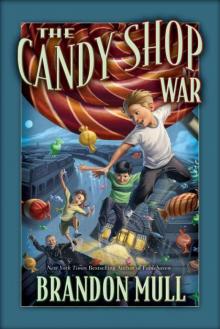 The Candy Shop War
The Candy Shop War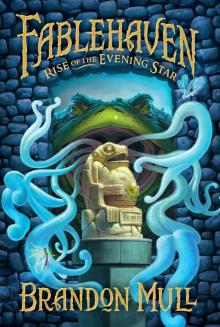 Rise of the Evening Star
Rise of the Evening Star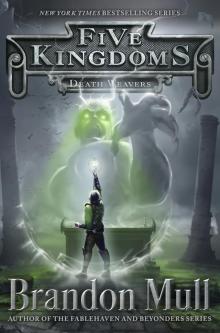 Death Weavers
Death Weavers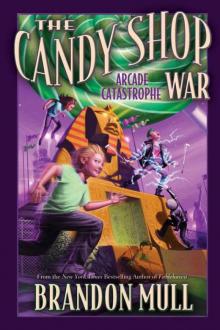 The Candy Shop War, Vol. 2: Arcade Catastrophe
The Candy Shop War, Vol. 2: Arcade Catastrophe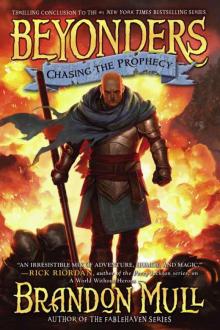 Chasing the Prophecy
Chasing the Prophecy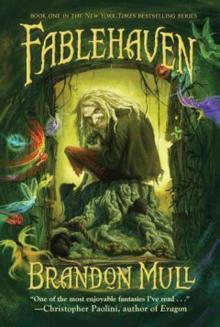 Fablehaven
Fablehaven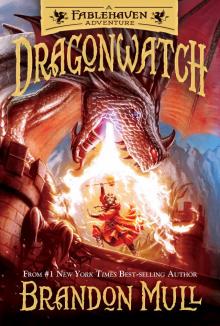 Dragonwatch
Dragonwatch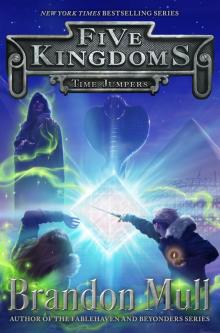 Time Jumpers
Time Jumpers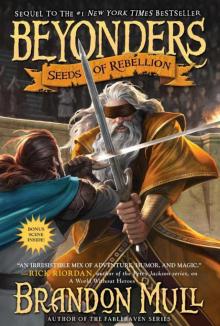 Seeds of Rebellion
Seeds of Rebellion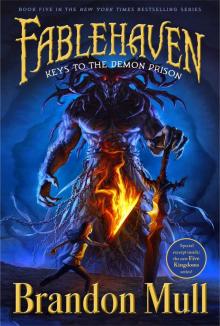 Keys to the Demon Prison
Keys to the Demon Prison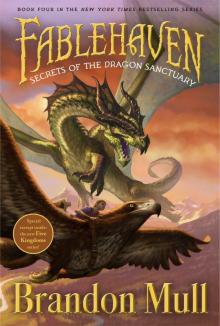 Secrets of the Dragon Sanctuary
Secrets of the Dragon Sanctuary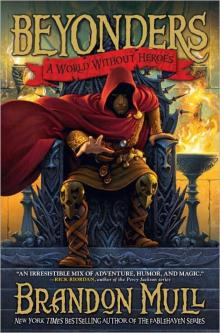 A World Without Heroes
A World Without Heroes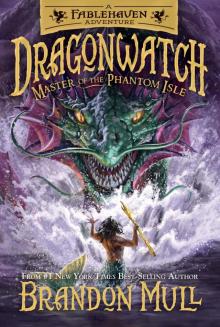 Master of the Phantom Isle
Master of the Phantom Isle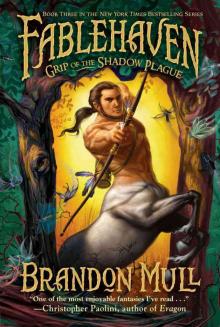 Grip of the Shadow Plague
Grip of the Shadow Plague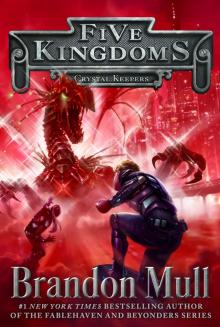 Crystal Keepers
Crystal Keepers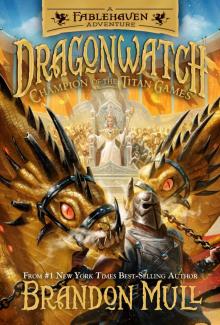 Champion of the Titan Games
Champion of the Titan Games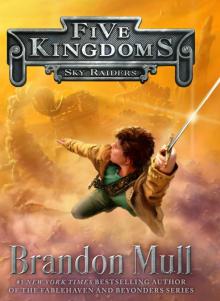 Sky Raiders
Sky Raiders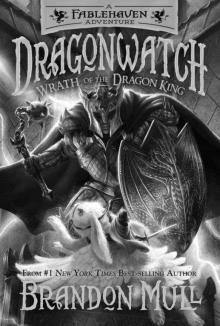 Dragonwatch, Book 2: Wrath of the Dragon King
Dragonwatch, Book 2: Wrath of the Dragon King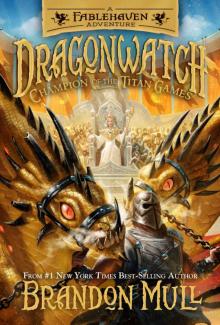 Dragonwatch, vol. 4: Champion of the Titan Games
Dragonwatch, vol. 4: Champion of the Titan Games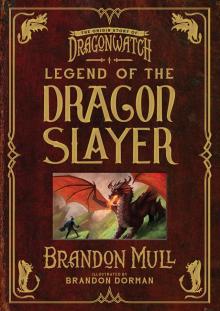 Legend of the Dragon Slayer
Legend of the Dragon Slayer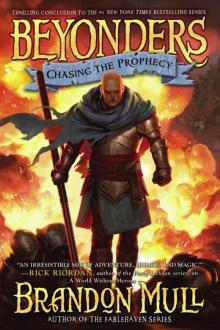 Chasing the Prophecy (Beyonders)
Chasing the Prophecy (Beyonders)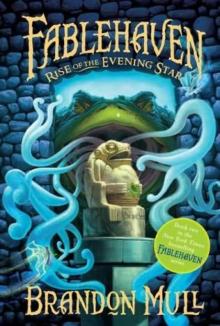 Fablehaven2-Rise of the Evening Star
Fablehaven2-Rise of the Evening Star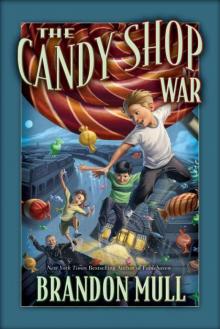 Candy Shop War
Candy Shop War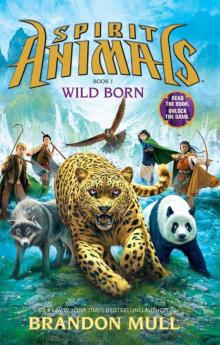 Wild Born
Wild Born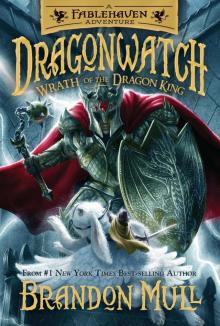 Wrath of the Dragon King
Wrath of the Dragon King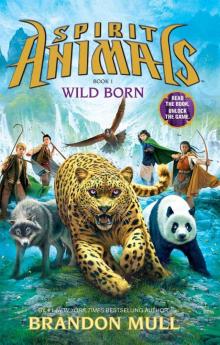 Spirit Animals Book 1: Wild Born
Spirit Animals Book 1: Wild Born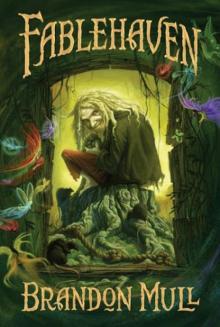 Fablehaven1-Fablehaven
Fablehaven1-Fablehaven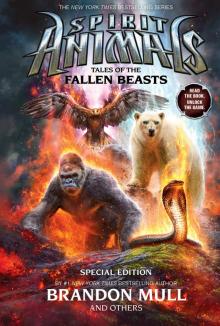 Tales of the Fallen Beasts
Tales of the Fallen Beasts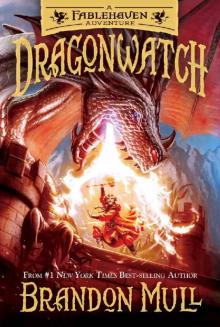 Dragonwatch: A Fablehaven Adventure
Dragonwatch: A Fablehaven Adventure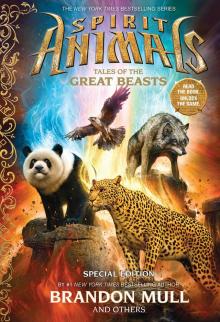 Tales of the Great Beasts
Tales of the Great Beasts